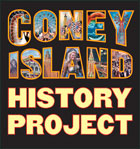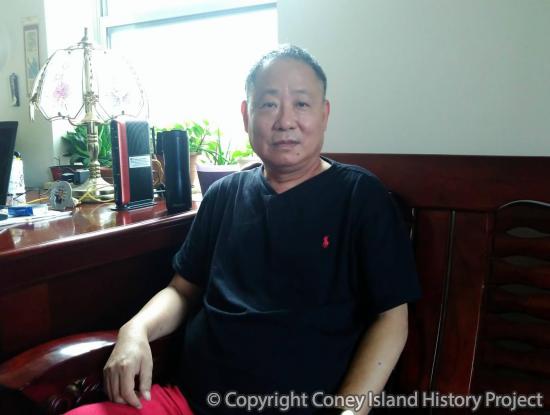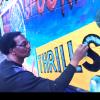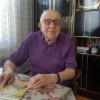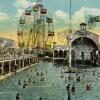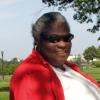Coney Island History Project Oral History Archive
Interviewee: Anthony Wang
Interviewer: Xiaoyan Li
http://www.coneyislandhistory.org/oral-history-archive/anthony-wang
Content © 2017 Coney Island History Project. All material on the CIHP website is copyrighted and cannot be used without permission.
Xiaoyan Li - This is Xiaoyan Li for the Coney Island History Project. And today we are talking with Anthony Wang and he is a resident of Coney Island. Because he is originally from mainland China, today the interview will be conducted in Mandarin Chinese. Now we will start the oral history interview. Could you please introduce yourself and tell a little bit about your early life?
Anthony Wang - My first name is Anthony, my last name is Wang. I was born into a very wealthy family in 1947 in Shanghai. My father was born in Jinhua, Zhejiang province. He went to the Central Police Academy. At that time, it was a place to foster high level officials so after his graduation, he came back to Jinhua as the first head of the county. A few years later, he was assigned to the police department in Shanghai.
In 1949, the police chief told my father that he had four plane tickets for Taiwan. At the time, even steamer tickets were not available, not to mention plane tickets. He said two tickets were for his wife and himself, the other two were for my family. At that time, I was the only child in the family, my mom worried about being alone in Taiwan. So she made a stand against leaving.
When I was around 5 to 7 years old, the Campaign to Suppress Counterrevolutionaries was launched in mainland China. My dad was identified as a counterrevolutionary and was sentenced to 15 years in a labor camp in Xinjiang. At that time, I remember that I was bullied, discriminated against, abused and beaten by other children in my neighborhood for no reason. Because I was too emaciated to fight against them, I tried to strengthen myself through learning martial arts. I got up at 5 am when the alarm went off every morning. There was an empty place where I could learn martial arts with several fellow disciples and a master. After dawn, at around 7 or 8 am, I went back home to change clothes and eat my breakfast and then went to school.
I studied very well when I was in middle school. I was the Chinese class representative and won all kinds of awards. When I was a senior, I had to choose the type of school that I intended to go to. We had three choices at that time including high school, secondary school and technical school. I figured out that if I went to high school, I won’t be admitted because the Party wouldn’t foster a person like me. Even if I made it, I wouldn’t have any future after my graduation. However, technical school aims to train skilled workers. I was not willing to be a worker. So at last, I chose secondary school with a major in shipbuilding, which was quite hard. One day after the exam, my mom told me that I was admitted. One of her former colleagues was a teacher at our school and she called my mom and said: ‘Congratulations! Your son has been admitted.’ I was so proud of myself. I passed such a difficult test and could go to a school that I liked. One week before the nomination, the dean of students came and said: ‘Let me tell you, you are not admitted!’ I said: ‘Why?’ ‘It is all because your father is a counterrevolutionary!’ ‘The fact that my father was a counterrevolutionary has nothing to do with me,’ I said to myself quietly. ‘The only choice that you have now is going to Xinjiang to join the Production and Construction Corps,’ he suggested. I knew it was grueling work there, so I didn’t go.
[Note: From the 1950s-1970s, people who had political problems would be sent to labor camps in Xinjiang. Between 1964 and 1971, China carried out the “The Third Front” development program to create a self-sufficient area in the remote regions of southwestern and western China. Anthony participated in this program and was sent to Panzhihua in Yunnan province.]
When we headed for Panzhihua, we should take the train to Kunming and then transfer to the bus. However, at that time, the railway hadn’t been built to Kunming. Instead, we had to stop at Guiyang. I remember that the Guiyang railway station hadn’t yet been built and there was no platform, so we jumped down from the train to the ground. When we arrived at Guiyang, we had been on the bus for several days and then arrived at Gejiu. There was a narrow-gauge railway built by the French like the one in the film ‘Lenin in 1918’ running in Gejiu. It was very old and trundled and rocked lethargically to Kunming. We stayed in Kunming for 15 days because of a shortage of busses. Then we spent two days on the bus to Panzhihua. The bus was running on the Yunnan-Guizhou Plateau and the weather was very hot and we were very thirsty en route, so we drank water from the Jinsha River. And because there were seldom any women there, we bathed in the river. The water was from the Himalaya Mountains and very cool. To go to Panzhihua, we had to pass a suspension bridge. Fortunately, our bus could go over it. After we had our supper, we were sent to the opposite bank. We did a lot of stop-and-go driving because the road hadn’t been completely built and many road builders were working there. The way that they built the road was very outdated. They got stones from the mountain around them and hit them with sledge hammers and steel bars and then dynamite. They didn’t have a bulldozer and leveled the road with bamboo. At night, they slept on the bamboo with several stones under them. It was very labor intensive.
We started working on construction. The work that I feared most was carrying the boxes containing explosives from the van to a cave. There was a steep slope leading to the cave. While I was walking on it, I would always be afraid of slipping down and causing the explosives to detonate. Our house had no roof, but eventually a roof was added. The climate on the Yunnan-Guizhou Plateau consisted of a dry season and a rainy season. During the summer, mud and sand flew together with the water, so we didn’t even have clean water to wash our clothes and drink. If you poured a bottle of water, the sand would sink to the bottom and you would see half water and half sand in the bottle. Most of the time, we drew water from the river to a water storage pond. I lived there for more than seven years and moved from one place to another more than ten times working on different construction projects. After we finished the projects there, we moved to a place called Pingdingshan in Henan province. There was a coal mine and they built an electric power station near the coal-mine. We assisted with the technical engineering. I worked there until 1992.
When I had just started working in Panzhihua, the Cultural Revolution began all around China. At the time, a lot of posters about me were posted on the wall. I didn’t do anything bad. Sometimes, the militia would lift the netting on my bed to confirm whether I was there. To be honest, for a young man who was only eighteen years old, it was hard to bear all of this. I thought about committing suicide by jumping into the Jinsha River. I thought of my mom. What would happen to her if I died? So I didn’t kill myself and lived through all of this.
When we moved to Henan, I remember once that without any warning, I was singled out for criticism at an assembly of 300 people. It was in the early 1970s. At that time, there was an army garrison near us. Among the soldiers there were several from Wenzhou. They liked me a lot because I was from Shanghai. They usually visited me and had parties at my place. Other young people in my company also came and joined us. We sang together and told jokes. We had a lot of fun. One of them was a private secretary to a general. He showed me a book called The Glory and the Dream. It could only be accessed through the government system. Upon reading the book, for the first time I got to know the truth about the Korean War. A lot of other impressive information was in that book, but I can’t clearly remember it now.
Later, the Cultural Revolution ended. I got together with those who were oppressed by the Party during the Cultural Revolution distributing anti-Communist slogans. And we stood up against the leaders. As a result, they were afraid of us. They knew that they had done the worst to us before. When the leaders came to my home and asked about my plans for the future, I didn’t say a word to them. I knew they were trying to win me over by giving me what I wanted, but I didn’t ask for anything.
After the death of Mao, the political wind changed. The class struggle ended. The government tried their best to develop the economy. It was at that time that I started learning English on my own. It was very difficult. I couldn’t even read the alphabet. And the city that I was living in was too remote to find anyone who could speak English, so I could only learn by watching TV.
I had been working in that company [China Second Construction and Engineering Bureau – Mechanical Construction Company] for 26 years. As a forty-year-old man, it wasn’t easy for me to decide to leave for the U.S. And at that time, I was suffering from hyperthyroidism. I didn’t know that. I was only 108 pounds. When I was walking, it seemed that two bamboo sticks were walking. I was too weak to leave, but I reminded myself: All my sufferings were imposed by the Party. I have to leave the mainland to get away from them. I was forty years old. This might be my last chance to leave. I could still fight for a future for myself in the U.S. as a forty-year-old man.
When I first came here, I should say that I wanted to cry. I came here in May 1992. Bush was the president and he just won the Gulf War. But at that time, the economy was a complete mess. It was very hard to get a job. At last, I happened to find a job at a gas station in Chinatown. The boss took into consideration that I could speak some English and he let me work there. The gas station had no shelter and it was late November. I remember that winter was extremely cold. And I often got wet because of the rain or the snow. I really wanted to cry. At that time, a Chinese TV play called Beijing People in New York was shot there.
Now I will talk about my apartment. This senior apartment, I should say that there's no other senior housing better than this one. As you have seen, it is built to the standards of a hotel. I didn't buy this apartment. It was funded by wealthy people. It is different from the situation in mainland China. The government never forced them to do so. Philanthropists donate millions of dollars every year to the New York Foundation for Senior Citizens. Take my window screen for example, sometimes, there's only a small hole on it. They could mend it instead of changing it, but they change it. They have changed two window screens for me. You saw the carpet in the hallway, right? It is a mosaic carpet, one square meter costs more than one thousand dollars.
XL - Does this foundation only support projects in Coney Island?
AW - It was like this. The senior apartment project is only a very small part of their program. They have built six senior housing projects. There are four of them in mid-Manhattan. It's hard for them to find vacant lots to build senior apartments in mid-town, so later they built the other two in Brooklyn.
XL - How did you move into this senior apartment?
AW - It was like this. When I applied for a senior apartment, this one hadn't been finished. So I went to Lexington Avenue for an interview. I was lucky to get this nice apartment. It might be because I am disabled. The government requires that there should be 3-5 percent of the housing project assigned to the disabled. I liked my room a lot. You see, the southern rooms which could get the most sunshine are so dusty because they are close to the street. The northern rooms couldn’t get any sunshine. My room is in the north. We can bask in the sunshine in the morning. And as it is the last room on this floor, I get an extra window. You know what, the bricks on the wall outside the building are a kind of decoration. They are thin material pasted on the wall. The wall is made of fire retardant material. All of this is the hotel standard. You know, there are a lot of handrails in the restrooms. It is designed for seniors.
XL - How much do you have to pay per month?
AW - Only 30 percent of my income.
XL -Before you moved here, had you ever been here?
AW - I came here occasionally. You know, at the height of Coney Island, a lot of people were at the seaside enjoying their vacation. It was like the bathing beach in Qingdao today. Very crowded. We have photos of that time in the lobby. I will show you later. It was one hundred years ago. China didn't have this kind of amusement park until the late 1970s. When you got off the subway, did you see the big restaurant across the street? It is a century-old restaurant [Note: referring to Nathan’s]. You often need to wait in a long line if you want to eat there. They have a countdown clock on the wall. What is it for? It is for the Eating Contest on July 4th every year. Women also compete in the contest.
XL - What do they eat?
AW – Hot dogs! It has been getting more and more popular since we moved here. I remember one day I drove to the city in the morning. When I came back at around 3 pm, my car couldn’t get through. I was caught in a traffic jam because of the tourists. It was crazy!
And in mid-June, there is an annual Coney Island Mermaid Parade. On your way back, you can see a newly-built baseball field near the subway station. When it’s baseball season, many young people wait in a long line there. On 21st Street, there is a free public screening of films in English every Wednesday. On Friday night, we have displays of fireworks. So if you come at night, there would be more people than during the day. The street would be very crowded. Many policemen walk around.
XL - So there would be many activities, right?
AW - Right! Smaller children can ride the carousel, which is slow and safe. And bigger kids can ride bumper cars and coasters. On the Boardwalk, people sell hot dogs and clams on the half shell. Very delicious! You can shoot the balloons with an air gun. If you can bust several of them, you win a stuffed toy. I’ve seen a young girl get a large one, even taller than her. It is very appealing to kids.
There are several police stations in this neighborhood. The one beside the subway is only responsible for the subway. The largest one is on West 8th Street. There’s another one around this corner that is responsible for the building. They are established to keep the peace in this neighborhood.
The government invests in construction to promote tourism development, so it’s very important to make it a safe place. Now everything is under construction. They are tearing up the street to repair the sewer. It will take several years to finish it.
XL - When did those construction projects start?
AW - It was after Sandy. One year before Hurricane Sandy struck, the government informed the residents that there would be a flood, but in the end, nothing happened that year.
When Sandy was forecast, this building was closed after 7 pm. If you had a temporary shelter, you could go there. If you didn’t have one, the government would find one for you, such as in a public school.
I and my wife drove to Flushing. It was higher ground. Three days later, when I returned to Coney Island, I found mud everywhere. The streets were full of police. I asked them where to park. They told me that you could park wherever you like. Then I drove up to the door of my apartment because I didn’t want to walk in the mud. Later I and my wife moved into a hotel on 8th Avenue in Brooklyn. I came back every two or three days. They pitched many tents in the baseball field. The Federal Emergency Management Agency [FEMA] set up tables along the way to give away clothes, food and drinks. They also gave away hot lunches. Because of the lack of electricity, there was a line of generators providing electricity for residents.
I got two free blankets including a disposable one. One day, I was walking on the road wearing my sneakers without socks. Someone called to me and asked whether I needed socks. I said: “Okay!” And then he gave me some yellow bags. I asked: “What is it?” He said: “Warm your hands.” I took it back home and put it on my waist. It made me feel very comfortable.
I lived in that hotel for a month and paid 500 dollars. I called FEMA’s office: “I am living in a hotel. I can’t cook, so I have to buy prepared food every day.” At last, they reimbursed me 2,800 dollars.
XL - Tricia mentioned that she met you and your nurse at the seaside, is she Chinese? What do you usually do during the day?
AW - Yes, she is Chinese. If she is not here, I will watch TV online. When she is here, I chat with her while she is doing her work. There are many churches and senior centers in Coney Island. Every church would serve free food once a week. I usually have my breakfast at the senior center, including a cup of oatmeal, an apple, an egg, a bottle of milk. I only pay fifty cents for all of these. For lunch, you can have two slices of bread, vegetable, beef, chicken and salmon plus a cup of tea or coffee, only one dollar.
XL -Which one do you usually go?
AW - It is on 37th Street. I go there sometimes.
XL - What else do you do there besides having a meal?
AW - You can play Mahjong or table tennis or sing Karaoke there. But I usually go to the newly-built gym at the YMCA. There are two basketball courts on the roof. I can swim and have a sauna and exercise with the equipment. It is very expensive, but my insurance company covers it.
